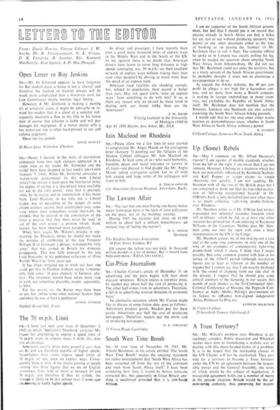The 70 m.p.h. Limit
Snt,—I have just seen your issue of December 3, 1965, in which 'Spectator's Notebook' criticises Mr. Fraser for attempting to impose a speed limit of 70 m.p.h. even on express ways. 1 think this does
an injustice.
Americans usually drive more powerful cars than we do and are therefore capable of higher speeds. Nevertheless most states impose speed limits of 70 m.p.h. or less, even on express ways. Conse- 4uently there is little of the insane passing at speeds running into three figures that we see on English .notorways. Cars tend to move at between 50 and 70 m.p.h. and therefore if they do collide, the Jamage is likely to be less serious than if some cars J.re moving at vastly higher speeds. As driver and passenger, I have recently been over a good many thousand miles of express ways in the Middle West and in the South of the US. In my opinion there is no doubt that American drivers have learnt to cover long distances at high speeds (averaging, say, 50 m.p.h.) on their excellent network of express ways without risking their lives (and other peoples') by driving at much more than the speed of an express train.
American road fatalities are shocking enough, but, related to population, their record is better than ours. May not speed limits, 'even on express ways,' have something to do with this? If so, is there any reason why we should be more timid in dealing with our motor lobby than are the Americans?
3. W. ROCHE
Visiting Lecturer in the University of Michigan (1965-6)
Apt. 41, 1586 Murfin, Ann Arbor, Mt., USA


































 Previous page
Previous page